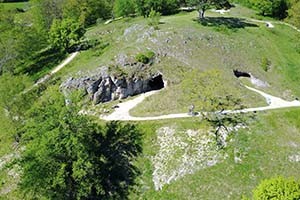
Only the most outstanding testimonies to the history of mankind are awarded the status of UNESCO World Heritage Site, and many of them are in Germany. Thousands of years of history have left behind a significant legacy, and it is the continuous goal of UNESCO to keep these valuable sites protected. Two places from very different eras are now coming into the spotlight of international recognition at the same time: the caves of the Ice Age in Baden-Württemberg, dating back 40,000 years, and architecture of the Bauhaus era, which began in 1919.
The UNESCO World Heritage Committee has named the caves of the Ice Age in the Swabian Jura in Baden-Württemberg to its list. More than 50 artifacts mostly made of bone and ivory, were discovered in six caves in the Ach- and Lonetal. These archaeological sites and prehistoric works of art from the Ice Age allow researchers to draw conclusions about the earliest traces of human settlement.
Visitors to Germany will experience the works of the Ice Age in various historical museums in Baden-Württemberg. The Prehistoric Museum Blaubeuren is a central museum for the Paleolithic period of the state of Baden-Württemberg. It displays, among other original finds, the “Venus vom Hohlenfels” and three flutes of the Ice Age. At various locations, visitors can not only marvel at the objects, but also try working with stone tools.
The museum of the University Tübingen displays a 40,000-year-old figure of a horse made of mammoth ivory, called “Vogelherdpferd“, and a cave named “Vogelherdhöhle“ is part of the archaeological park Niederstotzingen. Other artifacts from the era of hunters and gatherers are on display in the permanent Stone Age exhibition of the Landesmuseum Württemberg in Stuttgart.
UNESCO World Heritage Sites of the Bauhaus Era
The committee also decided to allow visitors to tour further Bauhaus buildings listed among the UNESCO World Heritage Sites. In addition to the architectural sites already included in 1996, the Bundesschule of the General German Trade Union Confederation in Bernau, as well as five arcades in Dessau-Rosslau are now added to the UNESCO World Heritage List. The exterior of the Bauhaus Memorial Bundesschule Bernau, north of Berlin, is open to the public all year round. Visits of the interiors are possible through guided tours, organized by the Association baudenkmal bundesschule bernau e.V., and visitors can tour the Dessau-Törten settlement.
Petra Hedorfer, chairman of the board of the GNTB, said, “Germany is already the number one cultural destination of Europeans today. With our theme campaign “UNESCO World Heritage Sites in Germany – Sustainable Culture and Nature Tourism,” in 2014 we have communicated responsible tourism to these particular cultural heritage sites worldwide. The inclusion of further unique testimonies of the cultural history of humanity on the UNESCO World Heritage list will give Destination Germany new impulses. As part of the 100th anniversary of the Bauhaus in 2019, we are preparing a further theme campaign.”
Detailed information on UNESCO World Heritage sites in Germany is available online at www.germany.travel.
For more travel features, visit:
www.huffingtonpost.com/author/karen-rubin
goingplacesnearandfar.wordpress.com
travelwritersmagazine.com/TravelFeaturesSyndicate/
goingplacesfarandnear.tumblr.com/
instagram.com/krubin0830/
instagram.com/famtravltr/
‘Like’ us on facebook.com/NewsPhotoFeatures
Twitter: @TravelFeatures
